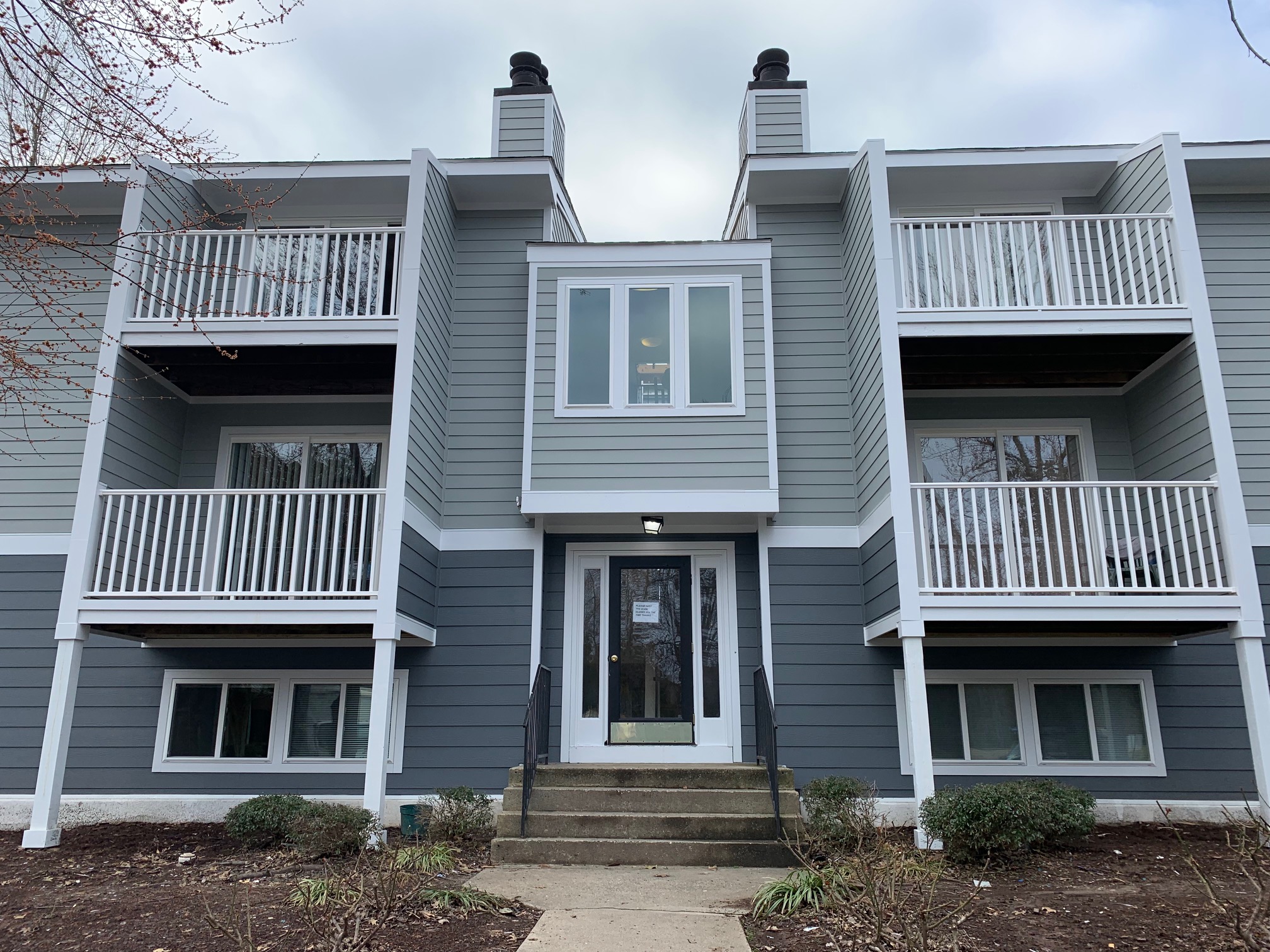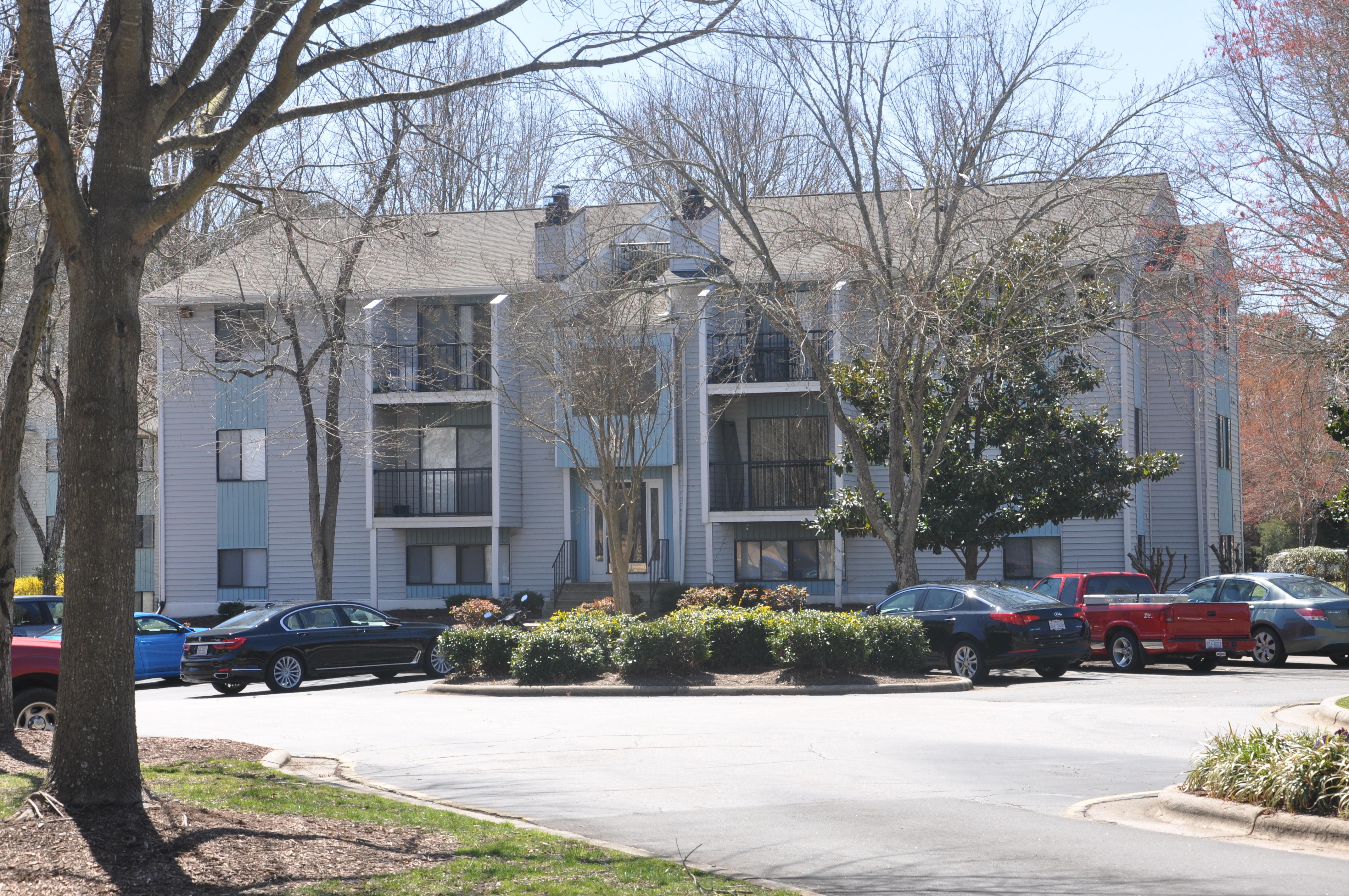A Chapel Hill developer and property-management company is offering an incentive for public employees to stay in town, instead of moving to Durham.
Over the last year-and-a-half, Eller Capital has acquired four old apartment communities in Chapel Hill, and renovated them. Rents, of course, were raised.
“It’s created an opportunity for us to fill a void in the market,” said Daniel Eller, president of Eller Capital Partners.
The renovated Eller properties include The Apartments at Midtown 501, formerly Foxcroft Apartments on Erwin Road; 86 North Apartment Homes, formerly Timberlyne Village; Timber Hollow Apartments; and Colonial Arms, which the company recently acquired for $3.6 million.
It’s been renamed 612 Hillsborough.
Opportunity for mid-level housing
According to Daniel Eller, 80 percent of multi-family housing in Chapel Hill is more than 25 years old.
And there’s a sharp distinction between regular life and luxury. Eller said that most people working for the town and UNC can’t afford to live in about five communities at the top of the market.
“The ones that are affordable – that people who work in Chapel Hill could live in – they don’t want to live there, because the quality of the housing isn’t what they could get if they drive 10 miles into Durham,” said Eller.
In response to what Eller Capital saw as a demand for higher-quality apartments at mid-level prices, the company purchased and “renovated some of the older assets,” according to Daniel Eller, with “luxury finishes” such as granite countertops, stainless steel appliances and plank flooring.
“We’re able to offer that at a price point that’s in the middle of those top-of-the-market assets, and the ones that are older,” said Eller.
Eller acknowledges that the housing market in Chapel Hill is heavily made up of government workers, and that they are among the most likely to seek housing in the Bull City, or elsewhere.
“You have university employees; Town of Chapel Hill; Town of Carrboro; Orange County,” said Eller. “Firemen, police, teachers – you know, all of these people have good jobs, good salaries, and are unfortunately in a situation where they afford the properties they want to live in.
“And the ones that they can afford, they don’t want to live in.”
Incentive deal
For those potential tenants, Eller Capital recently announced a plan to offer one-bedroom units with one bathroom at 86 North starting at $645 per month, instead of the current $795.
At Midtown 501, rates will start at $891 per month, instead of the normal $1,100.
Certain fees will also be waived for public employees, according to a press release.
Eller said that, between the two properties, public servants could save between $2,000 and $3,050 annually as tenants.
The incentive plan has drawn praise from Mayors Mark Kleinschmidt of Chapel Hill, and Lydia Lavelle of Carrboro, as well as Chapel Hill-Carrboro Schools Superintendent Tom Forcella, and Chapel Hill Police Chief Chris Blue.
Daniel Eller said that his company did not consult with the mayors of Carrboro and Chapel Hill before offering the incentives. However, recent discussions with Chapel Hill town government on a related matter did play a part.
In May of last year, the Council approved Eller Capital’s request to add 109 units to the 198-unit Timber Hollow Apartments. Addressing some council members’ concerns about the potential loss of affordable housing, Eller Capital agreed to keep 14 units in the affordable range, and to limit rent increases for longtime residents to between three and five percent a year, according to Chapel Hill News.
“As part of that expansion of the community, we have created an affordable housing plan that will be implemented at Timber Hollow,” said Daniel Eller. “And so, that, kind of, is what started us on the path of thinking about it.”
Eller told WCHL that, beginning in 2016, units will be set aside at Timber Hollow for tenants making between 65-to-80 percent of area median income.
Section 8 voucher issue remains
Still, some affordable housing advocates are concerned about a policy of Eller Capital and at least one other prominent management company that does a lot of business in Chapel Hill.
“As a company, we do not accept Section 8,” said Eller.
Eller pointed out that it’s a policy shared by other Chapel Hill landlords. He said that his company’s plan to offer discounts for public employees can accomplish at least some of the same goals of the voucher program.
“Unfortunately, there are pitfalls with the Section 8 program,” said Eller. “And I think that it’s something that is going to require partnership between the twins and private developers.”
Maggie West is a program coordinator with Community Empowerment Fund in Chapel Hill.
The CEF is a student-run non-profit organization, providing financial education and other support to unemployed and underemployed residents of Orange and Durham Counties.
West praised Eller’s incentive plan, but had some criticism as well.
“It’s a good gesture,” said West, “and more, of course, than they’re required to do. And I appreciate that. I wish it didn’t come on the tail of them evicting all the people that have housing choice vouchers.”
Housing Choice Vouchers are funded through the federal government’s Department of Housing and Urban Development. In Carrboro and Chapel Hill, they are administered by Orange County government.
Eligible renters are required to pay the difference between the rent charged by the landlord and the amount subsidized by the program.
Recently, leaders of the Towns of Chapel Hill and Carrboro began hearing that local landlords, including Eller Capital and General Services Corporation, had stopped accepting the vouchers.
Mayors Mark Kleinschmidt of Chapel Hill and Lydia Lavelle of Carrboro held a joint news conference last August, to publicly ask landlords to take the vouchers. They pointed out that it’s guaranteed money, every month.
Eller: Vouchers are inefficient
But Eller Capital doesn’t see it that way.
In an email to WCHL, Daniel Eller said that “much of the multifamily housing industry recognizes the inefficiencies of the Section 8 housing choice voucher program. The costs, regulations and duplicative requirements imposed on apartment companies that accept vouchers discourage them from participating in the program.”
Eller referred WCHL to a viewpoint published by the National Multifamily Housing Council, citing “inefficient and duplicative requirements” that make it too hard for landlords to accept vouchers.
According to the NMHC, those include a required three-way lease; repetitive unit inspections; and burdensome paperwork.
The NMHC also mentions a volatile funding situation, due to austerity measures imposed by Congress.
West said she’s not buying the funding argument in Chapel Hill.
“That may be the case in other areas,” said West. “I know, when the sequester happened, Orange County voucher recipients were not affected. No payments were skipped.”
The CEF has been trying to help relocate Chapel Hill and Carrboro residents whose former landlords no longer accept vouchers.
“Mostly, the tenants we’ve worked with from Eller have come from 86 North,” said West, “because, when it was Timberlyne apartments, it was one of the more affordable places to live, and still be on transit.”
West said it’s especially hard now to find housing for people with accessibility needs – those who require wheelchair ramps, or just close proximity to public transportation. She said the CEF has worked with three former 86 North tenants who need handicapped accessible units.
“Overall, from GSC and 86 North, and other landlords combined, we’ve worked with, probably about 50 different households over the last eight months,” said West.
Audrey Spencer-Horsley, director of the Orange County Department of Housing, Human Rights and Community Development told WCHL that her department has no record of Section 8 residents living at the former Colonial Arms, recently acquired by Eller Capital.




